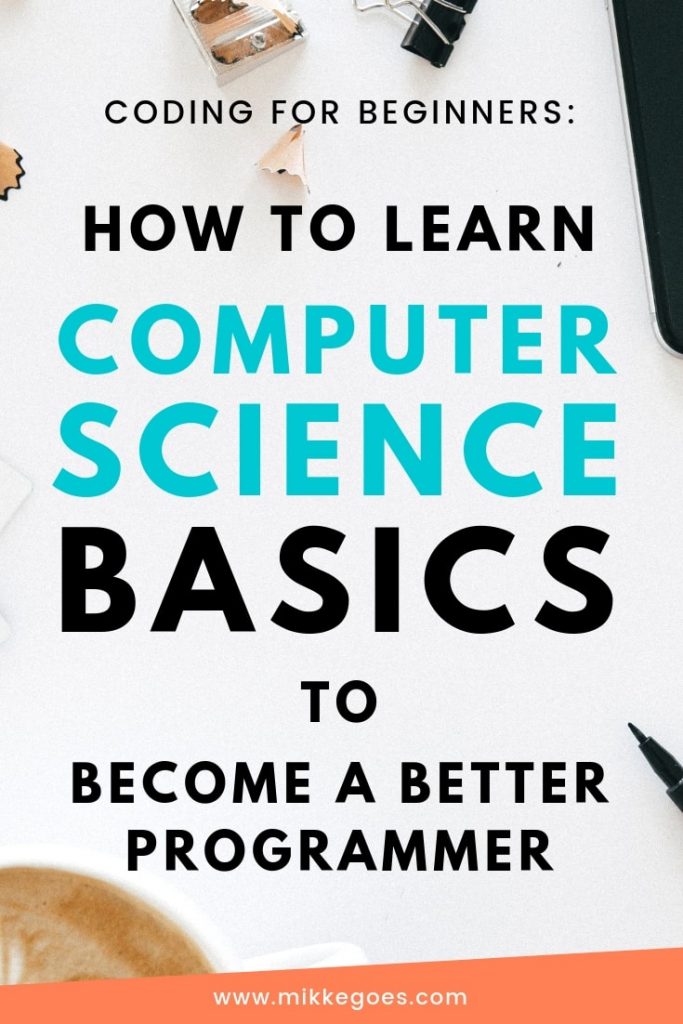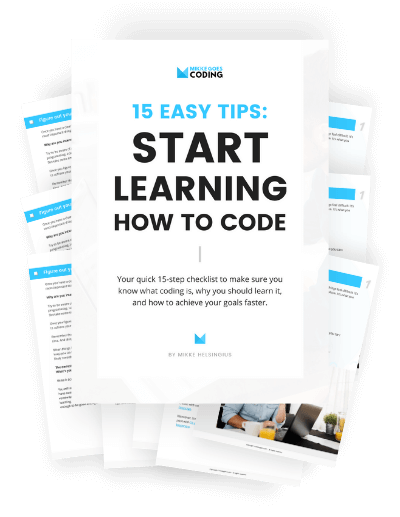I think you’ll agree with me when I say: Learning how to code is difficult!
When you’re just starting out with coding and web development, it’s hard to keep track of everything you need to learn. You may feel confused and frustrated when the learning curve becomes too steep to climb.
But, as it turns out, there’s a simple way to learn coding faster without feeling lost and overwhelmed.
And when you take advantage of this chance, you’ll save time and reach your coding goals more easily. And if you don’t, let’s just say that you’ll lose a ton of time, not understanding the very fundamentals of how coding works.
The solution to your problems is learning Computer Science basics before learning coding itself.
Sounds technical and difficult, but here’s the deal: You only need to learn some basic Computer Science fundamentals to see big results.
In this post, I’ll show you a few simple ways how Computer Science basics can help you gain more confidence in learning coding and web development as a beginner.
Keep reading!
Here are a few related articles you may want to read:
- The Best Websites to Learn How to Code (With No Experience)
- The Simple Way to Understand How Binary Code Works
- Which Programming Language Should I Learn? Beginner’s Guide
Please note: This post contains affiliate links to products I use and recommend. I may receive a small commission if you purchase through one of my links, at no additional cost to you. Thank you for your support!
CS 101: What is Computer Science?
Before we dive in deeper, let’s take a moment to figure out what Computer Science is all about.
If you’re new to coding and web development, you may not have a clear idea about what Computer Science entails.
And although you’ll hear tons of technical jargon in CS, the fundamentals are rather simple, really.
Whereas coding or computer programming is about making computers do what you want, Computer Science is about how computers do it.
In short: Computer Science is about understanding what happens inside a computer when you run your code and execute your programs. You know, things like how your computer performs the tasks your code tells it to do.
But more importantly, Computer Science is about how the different parts of your computer work together.
Recommended: Learn Coding for Free: What is Coding?
Now, I know this might sound a tad abstract. To make things easier, let’s consider a practical example:
Think about driving a car. Let’s say you’re sitting at the steering wheel. You’re giving your car instructions by using the pedals and shifting gears, right?
Programming works in a similar way: You’re giving your computer a set of instructions with your code and your programs.
And when you’re driving, you (should) know how your car works. You went to driving school to learn what all the bells and whistles in your dashboard do.
Learning Computer Science basics is like learning how to drive your computer. When you have a better idea about what’s happening inside your computer, you know how to drive it properly.
Hence, let’s sum it up briefly:
- Computer Science (CS) is about what computers can do.
- Programming is the practice of making computers do those things.

Why should you learn Computer Science basics for coding?
Ok, so what’s the point in learning Computer Science basics for coding then?
Well, think about how much better and safer you drive when you know how your car works.
In a similar way, understanding a few Computer Science fundamentals will help you become a better programmer.
The best part:
You’ll know how to write code that will make the most of your computer’s resources. You’ll know how to write code that is easy on the memory, the CPU, the graphics unit etc.
That said, here are the three biggest advantages from learning Computer Science basics as a beginner programmer:
Reason #1: You’ll learn coding faster
When you start learning how to code, you have a LOT on your plate.
Not only do you need to learn a lot of new stuff, but most of it is packed with cryptic jargon you’ve never heard before. You can easily feel confused and overwhelmed by the massive amount of new terminology.
The easiest way to know what all those technical terms mean is by learning Computer Science basics.
I mean, coding is all about giving instructions to computers by writing programs, right? That said, how could you become an expert programmer if you don’t understand the machines you write your code for?
My point is: After learning Computer Science basics, you’ll have a solid understanding about what computers can do for you.
You’ll also learn coding a lot faster, since you’ll already be familiar with most of the technical terminology you hear when you’re learning programming.
Recommended article: 10 Practical Tips for Learning Coding Faster
Reason #2: You’ll know how to write better code
Needless to say, any computer on this planet has limited resources. You laptop only has so much RAM, so much CPU power, etc.
At the same time, you’ll expect your computer to always to deliver optimal performance. And I think you’ll agree with me on this: Nobody likes to wait for a program or website to load.
Therefore, one of your future goals as a programmer is to write good, efficient code.
In other words, your code and programs should run and execute fast. They should only use as much resources as necessary.
That said, being aware of how computers work and perform the tasks we give them, you’ll know how to write better code.
Recommended article: 8 Critical Things to Know Before Learning Programming
Reason #3: You’ll learn how to solve problems faster
Ok, I saved the best for last.
As I said in the point above, learning Computer Science basics will help you write better code. Because all computers have limited resources, you’ll become more aware of the limitations to your programs, too.
Thus, understanding Computer Science fundamentals will help you plan and build more efficient projects.
And since coding is all about solving problems, you’ll know how to find new, more efficient solutions to your problems more easily. You won’t repeat yourself in your code.
Also, you’ll know when you can reuse code snippets you’ve already written, etc.
All in all, learning Computer Science basics will help you learn coding faster. You’ll have a robust understanding of the technical terminology, so you won’t waste your time feeling confused with it.
Read also: Computer Science Basics: What is a Computer?
You still with me? How’s your coding journey coming along so far? Have you thought about learning Computer Science basics to boost your coding skills yet? Drop me a line and share your thoughts in the comments section below!
How to teach yourself Computer Science: College degree vs. online resources
When a good developer friend of mine suggested I should learn Computer Science fundamentals, I immediately thought I need to go to college. I mean, heaps of developers learn Computer Science by getting a degree.
Well, first of all, I didn’t have that kind of time. Let alone the savings to invest in tuitions over four consecutive years.
But, as it turns out, you don’t need a college Computer Science degree to learn coding faster. You can find heaps of amazing learning resources online – at a fraction of the price.
Now, I’d be lying if I said a college degree can be substituted with just a few quality online resources.
But if you simply want to learn coding and web development to become a full-time developer or start freelancing to make money from coding, online resources are perfectly OK to use.
Recommended article: How to Learn Coding Fast? Online Courses vs Programming Books
Where to learn Computer Science online?
When I started learning coding from scratch, I felt 100% lost, confused, and overwhelmed by all of it.
Yes, I learned the basics of Python and a few other languages rather quickly. But I had the feeling that something important was missing. I didn’t fully understand what I was doing, really.
That’s when a friend told me to take a break from my coding courses and start a Computer Science online course for beginners. And just after a few lessons, I felt something go “click” in my head. I knew how the different parts of my computer worked together, which helped me write better, more efficient code and programs.
Thus, if you’re new to coding, I can fully recommend taking a Computer Science online course to get started. You only need to invest a few bucks in a quality course. The money will pay itself back sooner than you think.
To find the perfect course to start with, head over to my post about The Best Online Computer Science Courses For Beginners.
Recommended articles for you:
- Top 10 Reasons for Starting an Online Coding Course Today
- 7 Simple Ways to Get Your Money’s Worth With Online Coding Courses
Remember: Learn the basics – Don’t try to understand everything
Alright, here’s one final tip for you when you start learning Computer Science basics from scratch:
When you’re just starting out with coding, you already have enough work cut out for you. You don’t want to confuse yourself by aiming too high and setting yourself too ambitious goals.
Therefore, just start small and learn one thing at a time. You only need to understand the very basics at this point.
If you try to understand everything, you’ll get nothing done. Trust me, I’ve been there. If coding is totally new to you, you’re dealing with an insane amount of new technical terminology. Just take it one step at a time.
In short: Try to find a balance between understanding most of it and letting some things slide that feel too difficult to understand. I know it may sound hard to know how to decide what to push aside for now. But trust me, you’ll soon know which topics are helpful and which are just “nice to know”.
I know you’ll do a great job at it, so don’t worry! All you need is a good amount of determination and one of the courses we discussed above!
Read also: 13 Simple Tips For Finishing Every Coding Course You Start

Final thoughts: Learning Computer Science basics
Even if you’re new to coding. Even if you’re feeling completely lost and overwhelmed by everything you need to learn.
Learning Computer Science basics will help you pick up the pace and learn coding more easily.
I hope you found a few helpful tips and resources in this article. How’s your coding coming along? Have you thought about learning Computer Science basics to help you reach your coding goals faster? Just drop me a line in the comments below! I’d love to hear your thoughts!
Now that you know how to get started with coding and Computer Science, head over to my Free Coding Guide for Beginners to take the first steps.
Or if you’re ready to start your first online coding course, you should check out my article with the Best Websites to Learn to Code for Beginners. I’ll see you there!
Here are a couple of helpful posts you may want to read, too:
- Computer Science Basics: How Does Binary Code Work?
- The Best HTML and CSS Courses for Beginners
- CS 101: What is a Computer?
If you found this post on learning Computer Science basics helpful, please share your thoughts in the comments section!
P.S. Feel free to share this post with others so that they can find it, too! Thanks!
Happy coding!
– Mikke




Thanks Mikke. I appreciate the clarity and enthusiasm of your articles. 🙂
Hi Simeon,
thanks so much for your lovely words! I am happy to hear that you’ve found helpful tips in my guides 🙂
Happy learning!
This was such a great post – clear, concise, and encouraging. Thank you!
Hi do you do personal tutoring?
This is great, thanks Mikke for sharing! I’m interested in your thoughts on the current state of eLearning – Do you think its practical? Is it hard for students to stay motived by themselves? Do you think you can get the same quality of education without a university?
I’ve also been working on an aggregation of some of my favorite resources in case they can help you in your future articles and posts: https://qvault.io/2020/11/18/comprehensive-guide-to-learn-computer-science-online/
Thanks Mikke, that’s great and I’ve to read your article you’re very nice, but there are a lot of articles so when I start learning as a beginner where I should start from ?
#fronend developer
If anyone could teach me how to code well or even learn how to use and know about my laptop in a professional manner. I would pay you the first $25,000.00 I ever made and if I was successful in the field. I would give you 4 times that. But I know it will never happen. I respect you guys. I know I’m a pretty smart guy but my kid is better than me with a computer. I agree about learning about how the computer works before learning to code. That’s like throwing someone off a boat and telling them to swim in water they’ve never been in. My wife is a programmer and a supervisor of one of the groups and I see (actually hear) them getting chewed because they will crash a customer’s system from one key stroke and they can’t fix it most of the time because of the basic computer science. I’ve seen it happen 4 times now in 6 months. I would love to learn one day. Maybe who knows. Good luck guys. Keep making that tech for us. Good job to all of you